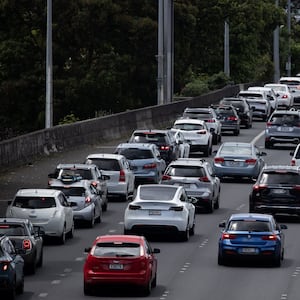Politics
Eroad Sees Share Surge as New Road User Charges Announced

Auckland-based technology firm Eroad experienced a significant increase in its share price, rising by one-third, following the announcement of a proposed universal road user charge system by the New Zealand Government. This new approach aims to replace the current petrol tax and could be operational as early as 2027. However, Transport Minister Chris Bishop has not confirmed a specific date for full implementation.
The proposed system is designed to streamline road user payments by integrating road tolls and congestion charges into a single transaction. Bishop emphasized the convenience of this approach, suggesting it would facilitate easier payment for motorists. Nonetheless, the proposal has sparked concerns regarding privacy, particularly as the system would involve tracking vehicle movements.
On social media, users expressed anxiety over the potential for government surveillance, fearing that their locations could be monitored continuously. The discussion around privacy intensified after Bishop’s announcement, with many questioning the extent to which personal data would be collected and utilized.
Motoring expert Clive Matthew-Wilson raised questions about the practicality of implementing such a system. He highlighted that the most affordable mileage monitoring hardware currently costs just under $300 and often includes ongoing monthly fees. This raises concerns about whether the system would be accessible to all drivers and how it would impact those with limited financial means.
Potential Implications for Drivers
The introduction of a universal road user charge system could have significant implications for New Zealand’s drivers. If implemented, this system would alter how motorists contribute to road maintenance and infrastructure funding. Currently, petrol taxes are a primary source of revenue for these purposes, and transitioning to a mileage-based system could lead to changes in driving habits and vehicle choices.
Critics of the proposed system have pointed out potential barriers, including the financial burden of new technology on consumers. The initial cost of hardware, combined with ongoing subscription fees, may discourage some drivers from participating in the scheme. As New Zealand moves toward enhanced vehicle tracking, it will be essential for the government to address these concerns to ensure equitable access to the system.
The government has yet to release detailed plans on how the system will be implemented or how it will address privacy concerns. As discussions continue, stakeholders from various sectors, including technology providers and consumer advocates, will likely play a crucial role in shaping the final framework of the road user charge system.
In summary, the new road user charge proposal has generated significant interest and concern among the public and industry experts alike. While Eroad celebrates its share price increase, the broader implications of this initiative warrant careful consideration as New Zealand prepares for potential changes in its road funding structure.
-

 World1 week ago
World1 week agoPrivate Funeral Held for Dean Field and His Three Children
-

 Top Stories2 weeks ago
Top Stories2 weeks agoFuneral Planned for Field Siblings After Tragic House Fire
-

 Sports3 months ago
Sports3 months agoNetball New Zealand Stands Down Dame Noeline Taurua for Series
-

 Entertainment3 months ago
Entertainment3 months agoTributes Pour In for Lachlan Rofe, Reality Star, Dead at 47
-

 Entertainment2 months ago
Entertainment2 months agoNew ‘Maverick’ Chaser Joins Beat the Chasers Season Finale
-

 Sports3 months ago
Sports3 months agoSilver Ferns Legend Laura Langman Criticizes Team’s Attitude
-

 Sports1 month ago
Sports1 month agoEli Katoa Rushed to Hospital After Sideline Incident During Match
-

 World2 weeks ago
World2 weeks agoInvestigation Underway in Tragic Sanson House Fire Involving Family
-

 Politics2 months ago
Politics2 months agoNetball NZ Calls for Respect Amid Dame Taurua’s Standoff
-

 Top Stories2 weeks ago
Top Stories2 weeks agoShock and Grief Follow Tragic Family Deaths in New Zealand
-

 Entertainment3 months ago
Entertainment3 months agoKhloe Kardashian Embraces Innovative Stem Cell Therapy in Mexico
-

 World4 months ago
World4 months agoPolice Arrest Multiple Individuals During Funeral for Zain Taikato-Fox



















